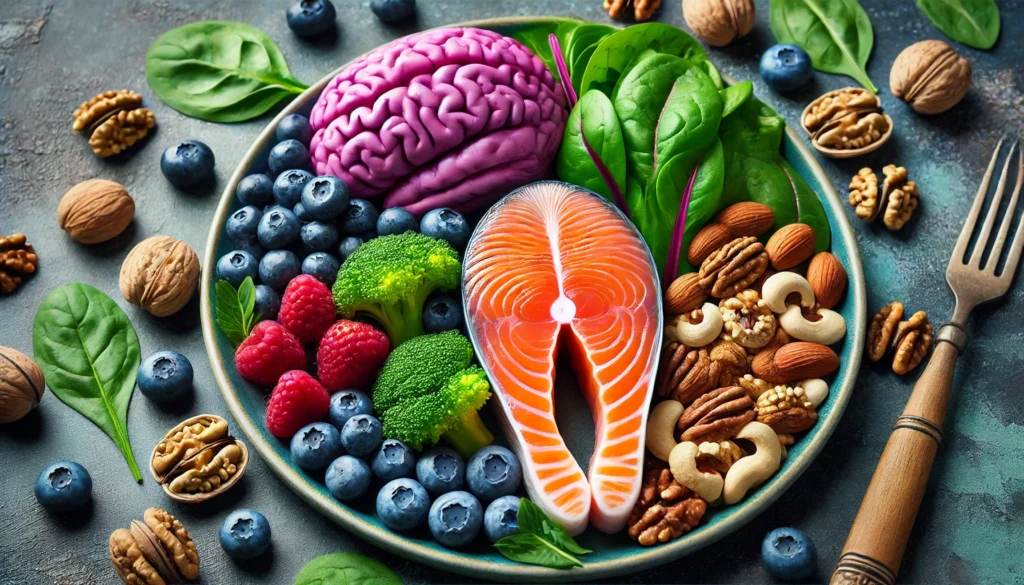Aging is an inevitable part of life, and with it comes the natural decline of various bodily functions, including brain health. However, this decline is not an inescapable fate. There are strategies and techniques that can help turn your aging brain around, keeping it sharp and vibrant well into your later years.
In this article, we’ll delve into five key strategies to revitalize your aging brain, providing a comprehensive guide that blends scientific insights with practical advice.
You may also like: Tips to Improve Low Average Memory Performance
Understanding the Aging Brain
Before exploring specific strategies, it’s crucial to understand what happens to the brain as we age. The brain undergoes several changes, including a reduction in brain volume, especially in the frontal cortex and hippocampus, which are critical areas for memory and cognitive function. This shrinkage can lead to slower cognitive processing and memory lapses.
Changes in Brain Structure
As we age, our brains naturally lose volume and weight. The shrinkage primarily affects areas responsible for essential functions such as memory, decision-making, and learning. This structural change is a natural part of aging but can be influenced by lifestyle choices.
Impact on Neurotransmitters
The production of neurotransmitters, such as dopamine and serotonin, tends to decline with age. These chemical messengers play a vital role in mood regulation, motivation, and cognitive function. A decrease in these neurotransmitters can affect mood stability and cognitive abilities, highlighting the need for strategies that support their levels.
The Role of Synaptic Connections
Synapses, the connections between neurons, can weaken over time, impacting the brain’s ability to communicate efficiently. This weakening affects cognitive processes such as learning and memory. However, engaging the brain in stimulating activities can help maintain synaptic strength and function.
Engage in Regular Physical Exercise
Physical exercise is not just beneficial for your body; it’s a powerful tool for maintaining brain health. Aerobic exercises, such as walking, running, or swimming, increase blood flow to the brain, which helps promote the growth of new blood vessels and brain cells. This, in turn, enhances memory and cognitive function.
Types of Exercises for Brain Health
Different types of exercises offer varied benefits for brain health. Aerobic exercises, strength training, and balance exercises each contribute uniquely to cognitive function. Aerobic activities boost overall brain health, while strength training supports memory and executive functions.
Frequency and Duration for Optimal Benefits
To maximize cognitive benefits, aim for at least 150 minutes of moderate aerobic activity or 75 minutes of vigorous activity weekly. Coupling this with strength training exercises two to three times a week can significantly enhance brain function and delay cognitive decline.
The Science Behind Exercise and Brain Health
Exercise stimulates the production of brain-derived neurotrophic factor (BDNF), a protein that supports the survival and growth of brain cells. BDNF also enhances synaptic plasticity, which is essential for learning and memory. By incorporating regular physical activity into your routine, you can help maintain your brain’s youthful functionality.
Nourish Your Brain with a Healthy Diet
What you eat significantly impacts your brain health. A diet rich in antioxidants, healthy fats, vitamins, and minerals provides the brain with the nutrients it needs to function optimally.

Essential Nutrients for Brain Health
Omega-3 fatty acids, antioxidants, and vitamins like B, D, and E play crucial roles in brain health. These nutrients help reduce inflammation, protect against oxidative stress, and support neurotransmitter function, which are vital for maintaining cognitive performance.
Foods to Include
- Fatty Fish: Rich in omega-3 fatty acids, which are crucial for brain health. Regular consumption of fish like salmon and sardines can support cognitive function and reduce the risk of neurodegenerative diseases.
- Berries: Packed with antioxidants that protect the brain from oxidative stress. Berries like blueberries and strawberries can improve memory and delay cognitive decline.
- Leafy Greens: High in nutrients like vitamin K, lutein, and folate that support brain health. Incorporating greens like spinach and kale into your diet can enhance brain function.
- Nuts and Seeds: Provide vitamin E, which has been linked to a reduction in cognitive decline. Almonds, walnuts, and flaxseeds are excellent sources of this nutrient.
Dietary Patterns for Cognitive Health
Adopting a Mediterranean-style diet, which emphasizes whole grains, fish, olive oil, and plenty of fruits and vegetables, has been associated with better cognitive function and a reduced risk of Alzheimer’s disease. This dietary pattern promotes brain health through a combination of healthy fats, fiber, and antioxidants.
Keep Your Mind Active
Cognitive stimulation is essential for maintaining brain health as we age. Engaging in mentally challenging activities helps preserve cognitive functions and may even stimulate the growth of new brain cells.
Benefits of Mental Stimulation
Keeping the mind active promotes neuroplasticity, the brain’s ability to reorganize itself by forming new neural connections. This adaptability is crucial for learning, memory, and overall cognitive resilience, especially in older age.
Activities to Consider
- Puzzles and Games: Engage in crosswords, Sudoku, or chess to challenge your brain. These activities help improve problem-solving skills and enhance mental agility.
- Learning New Skills: Take up a new hobby or learn a new language to keep your brain engaged. This continuous learning process stimulates different areas of the brain, promoting mental flexibility.
- Reading and Writing: Regularly read books and write to stimulate brain activity. These activities enhance comprehension, vocabulary, and critical thinking skills.
Social Engagement and Brain Health
Interacting socially is another effective way to keep the brain active. Participating in group activities, discussions, or clubs can provide cognitive stimulation and emotional support, both of which are essential for brain health.
Prioritize Quality Sleep
Sleep is often underestimated but plays a crucial role in brain health. During sleep, the brain consolidates memories and eliminates toxins accumulated during the day. Poor sleep is associated with cognitive decline and an increased risk of neurodegenerative diseases.
The Importance of Sleep Cycles
Understanding sleep cycles can help improve sleep quality. Deep sleep stages are crucial for memory consolidation and brain detoxification. Ensuring you get adequate deep sleep can enhance cognitive function and prevent memory issues.
Tips for Better Sleep
- Establish a Routine: Go to bed and wake up at the same time every day. Consistency helps regulate your body’s internal clock and improves sleep quality.
- Create a Sleep-Friendly Environment: Ensure your bedroom is dark, quiet, and cool. A comfortable sleep environment can significantly impact how well you sleep.
- Limit Screen Time: Avoid screens at least an hour before bed to promote better sleep quality. Blue light from screens can interfere with the body’s natural sleep-wake cycle.
Sleep Disorders and Cognitive Decline
Sleep disorders like insomnia and sleep apnea can exacerbate cognitive decline. Addressing these issues through medical consultation and lifestyle changes is essential for maintaining optimal brain health.
Manage Stress Effectively
Chronic stress can have detrimental effects on brain health, leading to memory problems and cognitive decline. Stress management techniques, such as mindfulness and meditation, can help reduce stress levels and promote brain health.
The Impact of Stress on the Brain
Chronic stress triggers the release of cortisol, a hormone that, in high levels, can damage brain cells and shrink the prefrontal cortex. Managing stress effectively can prevent these adverse effects and support cognitive health.
Techniques to Practice
- Mindfulness Meditation: Focus on the present moment to reduce stress and enhance cognitive function. Regular practice can increase gray matter density in the brain, improving memory and learning.
- Deep Breathing Exercises: Practice deep breathing to calm the mind and reduce stress. This simple technique can lower cortisol levels and promote relaxation.
- Yoga and Tai Chi: These practices combine physical movement with mindfulness, benefiting both body and brain. They enhance mood, improve balance, and support cognitive function.
The Role of Social Support
Having a strong social network can buffer the effects of stress. Engaging with friends and family, participating in group activities, and seeking support when needed can help reduce stress and its impact on brain health.

The Future of Brain Health
As research in neuroscience and brain health continues to evolve, new strategies and interventions are likely to emerge. Current trends include the exploration of nootropics and brain-training apps designed to enhance cognitive function. However, it’s essential to approach these with caution and rely on evidence-based practices.
Advances in Neuroscience
Recent advances in neuroscience are offering new insights into brain health. Innovative technologies and research methods are uncovering how different interventions can support cognitive function, paving the way for personalized brain health strategies.
The Role of Technology in Brain Health
Technology offers tools like brain-training apps and virtual reality experiences designed to enhance cognitive abilities. While promising, these tools should be used as supplements to, not replacements for, traditional methods of cognitive stimulation.
Ethical Considerations and Brain Health
As new brain health interventions emerge, ethical considerations must be addressed. The safety, accessibility, and long-term effects of new technologies and treatments should be thoroughly evaluated to ensure they benefit public health.

Conclusion
Revitalizing your aging brain is a multifaceted endeavor that involves physical, dietary, cognitive, and emotional components. By incorporating these strategies into your lifestyle, you can enhance your brain health and maintain cognitive function as you age. Remember, it’s never too late to start; small changes can lead to significant improvements in brain vitality.
By staying informed about the latest scientific research and trends, you can continue to make informed decisions about your health and well-being. Remember that a proactive approach to brain health can lead to a more vibrant and fulfilling life, well into your golden years.
Embracing a Holistic Approach
A holistic approach that integrates various aspects of health can provide the most comprehensive benefits for brain health. By addressing lifestyle factors collectively, you can create a supportive environment for cognitive vitality.
The Power of Consistency
Consistency in applying these strategies is key to achieving and maintaining brain health. Regularly engaging in healthy habits reinforces their benefits and helps sustain cognitive function over time.
Looking Forward
As we continue to learn more about brain health, remaining adaptable and open to incorporating new, evidence-based practices into your routine will be crucial. This forward-thinking approach can ensure you enjoy a vibrant and cognitively fulfilling life as you age.
Further Reading:
6 simple steps to keep your mind sharp at any age
Middle age: A critical turning point for brain health and cognition
Important Note: The information contained in this article is for general informational purposes only, and should not be construed as health or medical advice, nor is it intended to diagnose, prevent, treat, or cure any disease or health condition. Before embarking on any diet, fitness regimen, or program of nutritional supplementation, it is advisable to consult your healthcare professional in order to determine its safety and probable efficacy in terms of your individual state of health.
Regarding Nutritional Supplements Or Other Non-Prescription Health Products: If any nutritional supplements or other non-prescription health products are mentioned in the foregoing article, any claims or statements made about them have not been evaluated by the U.S. Food and Drug Administration, and such nutritional supplements or other health products are not intended to diagnose, treat, cure, or prevent any disease.


